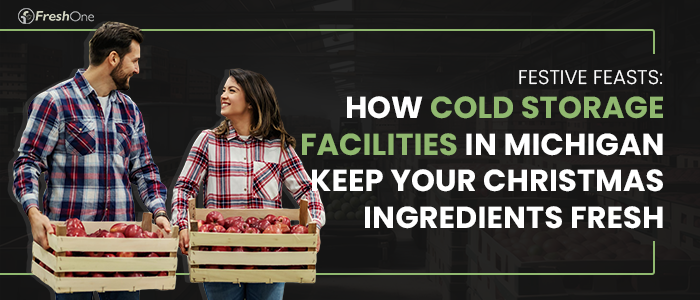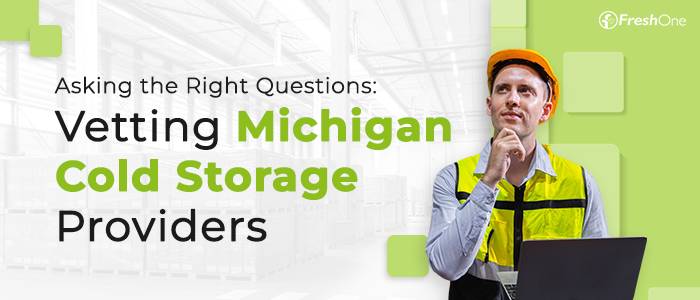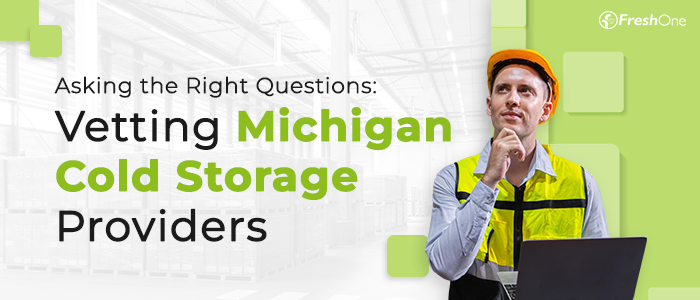Finding the right cold storage warehouse can be make-or-break for your Michigan business’s supply chain. With tons of options for commercial frozen and chilled warehousing in the state, it would be easy to find a fantastic provider. Well, yes and no. More competition forces companies to promise top-notch service. But you must still vet them thoroughly before trusting anyone with your valuable goods.
Asking savvy questions is vital to picking the perfect partner. You need clarity on what prospective facilities can and can’t do – their capabilities, capacity, costs, safety rules, tech status – and the works. Getting the whole picture is vital to avoid unpleasant surprises down the road. Don’t leave room for vague answers or assume they offer precisely what you need.
We put together this guide of must-ask questions when researching providers to find the best fit. It hits all the key points to bring to light during warehouse walkthroughs, requests for proposals, and service inquiries:
Temperature & Environment Controls
- Can you maintain consistent temperature ranges around the clock, meeting my goods’ specific chilled or frozen zone requirements?
- How well do you circulate air and regulate ventilation through all storage areas housing my products?
- What failover measures or backup systems are in place to avoid spoilage of my inventory during any unforeseen power or equipment failure incidents?
Businesses must inquire about the exact temperature capabilities to preserve inventory quality and prevent contamination issues or losses. Gathering information about air circulation, humidity regulation, backup systems, and monitoring capabilities is essential to guarantee the integrity of chilled or frozen products.
Food Safety & Compliance
- Could you provide documentation of current audits, licenses, and regulatory certifications verifying your ability to store and handle my products properly?
- What does your facility’s cleaning routine entail?
- How do you actively combat pests and mitigate contamination risks that could impact my inventory? Is comprehensive food safety training a mandatory part of your staff onboarding?
To ensure safety, requesting documentation of licenses, established HACCP programs, GFSI standards, and other certifications is essential. Before outsourcing inventory storage and distribution, businesses must validate all food safety certifications, handling policies, and staff training to minimize risk. Requiring regulatory licenses, audits, and GFSI standards documentation shows that the provider is dedicated to maintaining product integrity from receipt to shipment.
Space, Layout & Expansion Capability
- What is your available pallet capacity for renting out chilled and frozen storage space suited to my inventory categories?
- Can you accommodate those facility needs if I require customized storage solutions like meat hanging racks or unique layouts?
- How adaptable is your warehouse design such that you could reconfigure aspects to align better with my company’s distribution workflow?
- As my business scales up and our cold storage volume needs to amplify over time, can you provide assurances of expanding capacity thresholds to meet our growth quickly?
Businesses must clearly understand the available space and flexibility when selecting a cold storage partner. They should know the current pallet capacity, storage layout, and scalability options to ensure the provider can handle their workload needs and any unexpected growth without issues.
Inventory & Order Management Technology
- What warehouse management systems, EDI, scanner tools, visibility platforms, analytics dashboards, etc., comprise your current technology stack?
- As your customer, would I have access to tap into these systems you already have up and running?
- Do you foresee any integration issues between your existing technology suite and the supply chain management solutions my company relies on?
- Can your team configure all the customized inventory reports, labeling protocols, batch tracking specs, and order documentation formats that my business would need?
Asking tech questions allows you to assess automated inventory interfaces, real-time visibility, advanced reporting, and order processing functionality to meet their warehouse management ecosystem needs today and tomorrow as strategic objectives evolve.
Inbound/Outbound Transportation Access
- What inbound and outbound transportation modes can your facility support for getting my raw supplies delivered and finished products shipped?
- Would your shipping docks and material handling equipment suit my needs for pallet jacks, forklifts, conveyors, and floor trucks?
- From your experience, what are typical time frames I could expect for loading and unloading my inventory shipments?
- Do you have existing partnerships with refrigerated transportation companies that other businesses storing goods here also rely on?
Multimodal access and relationships with refrigerated transportation companies are essential for businesses to lock in capacity, efficiency, and savings around getting inbound ingredients and outbound finished goods shipped during peak periods.
Cost Structure & Billing
- Beyond the base fees per pallet and square footage, what other charges might I incur for additional services?
- How do you calculate and assign labor fees if I need specialized material handling moves?
- As an account holder, how much notice could I expect on upcoming rate hikes or changes to billing practices?
- What payment plans, structures, and tools do you provide to customers like me?
- Are there opportunities to earn discounted rates or storage incentives if I commit to a longer-term contract or higher volumes?
An itemized cost structure allows businesses to accurately model longer-term storage, labor, and miscellaneous fees to calculate the total investment for weighing ROI on proposed contracts before outsourcing inventory needs to a provider.
Insurance Coverage
- What types and levels of insurance do you carry for property, inventory, equipment, and liability should we need to file a claim?
- Can I add special provisions to our contract to account for the total value of my goods in storage if an incident occurs?
- Can I list my company as additional insured on your active policies that apply to our stored inventory?
Asking for coverage details lets businesses confirm adequate protection for inventory asset value and liability risks, allowing the flexibility to add special provisions or be listed as an additional insured party, granting financial peace of mind.
Why FreshOne Stands Out?
When evaluating quality cold storage in Michigan, FreshOne should be on your shortlist as a top-tier provider for businesses to consider. Operating temperature-controlled distribution and warehousing solutions since 2006, their experience is substantial. What truly distinguishes FreshOne is its commitment to supply chain transparency through logistics analytics and predictive technology adoption.
The FreshOne approach focuses on storing and transporting inventory under optimal conditions that align with your just-in-time delivery needs. Their ability to provide customized solutions tailored to get products where and when required matches well with modern business priorities.
While upholding best practices, they also push boundaries by emphasizing customer experience, sustainability initiatives, and IT infrastructure modernization. The comprehensive range of services offered makes for an attractive prospect. Partnering with FreshOne equates to more than merely a vendor transaction but rather a strategic relationship with a provider invested in your success.
Given the range of cold storage players competing for attention, asking discerning questions becomes essential to revealing those that best fit. With its blend of seasoned experience yet forward-thinking innovations alongside customer-centric flexibility, FreshOne represents a well-qualified option worth consideration, delivering reliability even amidst supply chain uncertainties.



